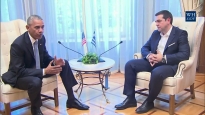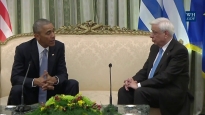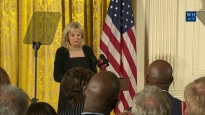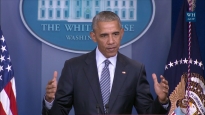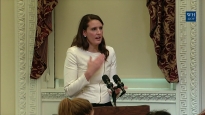First Lady Michelle Obama and Dr. Jill Biden Speak on Military Spouse Employment
February 27, 2012 | 19:11 | Public Domain
The First Lady and Dr. Jill Biden speak to governors about their Joining Forces initiative to help military spouses more easily transfer professional licenses across state lines.
Remarks by the First Lady and Dr. Biden Discussing Military Spouse Employment at National Governors Association Annual Meeting
State Dining Room
10:49 A.M. EST
DR. BIDEN: Thank you. (Applause.) Thank you, David, and thank you all for coming. It was great to see you all here last night -- what a wonderful evening. And we're so delighted to have you here again at the White House this morning.
The last time we were together, Michelle and I talked to you about our idea for the Joining Forces initiative: to honor, recognize and support military families. And in this last year, we've made tremendous progress. Since we launched Joining Forces in April, we've been so delighted by the response from Americans all over this country. Businesses have hired tens of thousands of veterans and military spouses. Medical schools have committed to educate their students about post-traumatic stress and traumatic brain injuries. Schools, community organizations and Americans of every age and background have sent care packages, donated childcare, and created community celebrations for the military families in their neighborhoods.
These Americans are stepping up because they appreciate how much our military spouses and families do for our country every day. What we have seen since launching Joining Forces has been truly gratifying, because it has shown our military families that all of us appreciate their sacrifices on their behalf.
But there is more to do. We would like to talk to you today about one of the top concerns we hear from military spouses wherever we go: professional licensing. I know that many of you hear from folks in your state as well.
A few days ago, Michelle and I went to the Pentagon to help unveil a new report from the Departments of Defense and Treasury about professional licensing for military spouses. The report found that military spouses move 10 times more than their civilian counterparts, and that 35 percent of spouses in the workforce are in jobs that require a professional license. Because military transfers often require spouses to move from state to state, the issue of license portability is a real challenge for military spouses. As Michelle will discuss, there are ways we can work together to ease this burden, and we look forward to doing just that.
So thank you all for what you're doing in your home states, and please join me in welcoming my dear friend and partner in Joining Forces, First Lady Michelle Obama. (Applause.)
MRS. OBAMA: Good morning, everyone, and welcome back. I hope everybody got a little sleep. (Laughter.) Just a little bit. But we had a terrific time last night. And the mood was good, and hopefully you all enjoyed yourselves as well. It's always wonderful to host you for this weekend.
I want to thank Jill, not just for her introduction but for just being a terrific partner and, more importantly, a friend over the past few years, and on this issue in particular. As a Blue Star mom, Jill knows these issues as well as anyone. And she has been just a terrific champion, and on ensuring that we're moving things forward.
Now, as Jill has said, this new licensing portability initiative is one of the most important and meaningful issues that we've addressed through Joining Forces. It is the number-one frustration that Jill and I hear about every time we visit with military spouses -- and that’s really saying something. Because the truth is, is that these women and men are facing plenty of very serious challenges in their lives. They are raising their kids and running their household, oftentimes alone, while they have a spouse deployed. These are the folks who are cooking those meals, they're leading the PTA, they're answering all those questions from their children about when mom or dad will be coming home. And many of them are doing all of this while trying to hold down full-time jobs.
But the truth is that no matter what is on their plates -- and this is what always impresses us -- no matter what their country asks of them, these men and women, they never complain. They never complain. And I know that many of our spouses understand that when they interact with military families. These people never ask for much. They just keep pushing forward.
So when they do bring something to our attention, when they do come to Jill and I and they ask for our help, when they do let us know that something is a real problem for them, then we know it's serious. We know it's time for us to take a look and figure out whether there's something that we can do. And when you hear about how -- some of these licensing stories, what's going on, then you start to understand why they’re beginning to get frustrated.
So take the story of Kelly Crowley. Kelly is a nurse, she’s an army wife and she’s an expectant mother. She has been married to her husband for four years and in those four years -- and this is very typical -- Kelly has lived in three different states, which means that every year or so she’s had to gather up her college transcripts, sign and notarize a pile of documents, and pay application costs, and then wait for all of that to clear.
And she estimates that the constant moves have cost her about six months of paychecks. Six months of paychecks from a woman who wants to work, a woman serving our country. Six months of paychecks. And the whole process can be so cumbersome that she’s not even sure that she’s going to go through it again for her family’s next assignment. She’s ready to walk away from her career because the burdens are so great.
And of course this doesn’t just happen to nurses -- it is happening to teachers, it’s happening to childcare providers, accountants, real estate brokers, dental hygienists, social workers -- I mean, go on and on. Think of the careers that require some level of licensing and these men and women are being affected. And in total, more than 100,000 military spouses are affected by this maze of credentialing and requirements -- 100,000 men and women. And far too often they’re forced to take entry-level classes, or pay hundreds of dollars in fees, or wait weeks or months for their paperwork to be processed all before they can even get a job; can’t even work until all this is done.
And the vast majority of these spouses are clearly qualified -- this isn’t an issue of these men and women being qualified and ready to work. They’ve got the right skills, they’ve worked in their fields for years, many of them, but so often that doesn’t matter. It doesn’t count. Their skills still go unused and, more importantly, their families go without the crucial source of income that so many of them need. Many of these families survive because they have two incomes. And unfortunately many career ambitions are just derailed. So, again, you can see why many of these spouses are frustrated.
Now I want to emphasize that these state standards are extremely important. They ensure that our professionals meet a level of excellence that gives us all peace of mind when we step into a hospital or we sign our kids up for school. So I want to be clear that we are not asking any state to change a single professional standard. And we’re certainly not asking anyone to set a lower bar for our military spouses -- they’re the first ones who don’t want exceptions to the rule for them. But what we are asking is for a level playing field. We just want to make sure that these spouses have a fair shot to pursue their careers and support their families.
And of course that’s where all of you come in. Each of you has a unique opportunity to make a real difference for these families that have given all of us so much. Some of you have already done this -- some of you have already stepped up, including Governor Gregoire in Washington, Governor Scott in Florida, Governor Nixon in Missouri, Governor Parnell in Alaska. In total, 12 governors have signed legislation to fix these licensing issues for military spouses, and of course we want to thank you all for leading the way.
And here’s what’s important: Each of those 12 states found its own solution, whatever worked for them. Some states are doing things like granting temporary licenses so that military spouses can get to work right away. Others have given state licensing boards or agencies increased flexibility to grant licenses to military spouses who clearly demonstrate their competence. And still others have found ways to grant licenses upon application and then verify the documentation as the spouse earns a paycheck.
And many more states are working on legislation as we speak -- California, Louisiana, Illinois and Wyoming have introduced bills in the last two weeks. Governor Brownback just signed Kansas’ bill on Valentine’s Day, a lovely gift. But roughly half of the country still hasn’t taken this issue on. And that's why Jill and I are here today.
As part of Joining Forces, we have set what we hope is an ambitious but achievable goal in that, by 2014, we would love to see all 50 states having passed their own legislation to address this issues -- by 2014. The goal is a key priority for this administration. Secretary Panetta is behind it. General Dempsey and all of the Joint Chiefs are behind it. The President, of course, the Vice President -- they don't have a choice. (Laughter.) But they do support it. (Laughter.)
But the people who have the biggest impact are right here in this room. Truly, you all have the power in this instance. No one can make a difference on this issue like all of you -- no one. And I’m not just talking about those of you with "Governor" behind your name. You’re really important and all, but we also have wonderful first spouses.
I mean, just look at what First Lady Jane Beshear has done in Kentucky. Now, Jane has formed a statewide team of military spouses who are tackling issues like education and employment in that state. She’s worked with state higher education leaders to streamline admissions processes for military spouses. She has testified in front of the state house. And she has done all of this in just a year.
In fact, Jane told me that after the last governors’ spouses, she was so moved by what we had talked about that she went back to her state and she figured out exactly what she could do to push this issue ahead.
So every single person in this room has a role to play in supporting our military families. And I am here, as well as Jill, to ask for your help -- as simple as that. If your state has not addressed license portability for military spouses yet, today I want to ask you to make this issue a priority. Work with the leaders in your states to get a bill introduced. Use your bully pulpit to get it passed. Share military spouses' stories with your local media and your state legislators.
If you have already passed a law in your state, we encourage you to reach out to one or two of your fellow governors or spouses who are just getting started. Share your experience. Encourage them along the way. Help us finish this job. And we will be helping as much as we can. We have a plan in place to be supportive. Like Jill said, the report from the Department of Defense and Treasury is full of wonderful tips and best practices to help all of you find solutions that work for your state. And that’s really the point. There is no one-size-fits-all solution here. And this report is really designed to offer some ideas to get things started.
Your staffs have received a copy of this report already, and all of your spouses will get one today as well. And on top of that, the Defense Department's team of state liaisons are here to help you craft legislation, if needed, and usher it through your state houses. In fact, we've got Ed Kringer -- Ed, where you are sitting, Ed? Ed is here from the Department of Defense, and Ed will be available after this session to answer any questions to help get you started in the process.
And Jill and I are going to keep working, keep the light on this issue. We're also going to be working with groups like the American Bar Association and the National Military Family Association to support your efforts at the grassroots level. They all stand ready to try to find ways to be helpful on this issue. So you're not in this alone. Joining Forces has been a wonderful instrument just to raise the bar, to shine a light on these issues. And we will continue to use this platform to be supportive and proactive.
And that’s really the thing about supporting military families that Jill and I have discovered through our work: It is something that everyone can get behind. It really is. Everyone feels this, and if they don’t, they just don’t know the stories. And once they hear the stories, they're right there. That is what we have seen since the day we first started Joining Forces. No matter who you are or where you come from, we are all so proud of our men and women in uniform and their families. We all are, and we all want to do everything we can to honor and to support these men and women, and these wonderful children who are sacrificing right alongside of their parents.
And taking on this licensing issue is a perfect way to do just that. It’s really the perfect opportunity because if we fix this, we don't just support our military spouses as they advance in their careers, which is important, but we’ll also be supporting their families who really depend on these incomes. We will be supporting the entire military, which can more easily retain married troops if their spouses can pursue their career. This is a retention issue.
We’ll be infusing our schools and our hospitals and our businesses with much needed, talented and experienced workers who are ready to be out there doing the job. We will be strengthening our economy by lowering our unemployment rate and increasing our productivity by getting these hundreds of thousands of men and women into the workforce.
And you all can do all of this -- here’s the punch line -- with little or no cost. Little or no cost. It’s one of those things that, again, doesn't -- as other state governors will share, it doesn't have to kill the budget, and it can be done in a bipartisan way, even more importantly. All it takes is a leader who can lead the charge for these families who serve our country so bravely.
These men and women have risked so much for all of us. They do it for each and every one of us, and they ask so little in return, so very little. So when they call on us, we have got a solemn obligation to answer that call.
In two years, what I hope we are able to say -- we can look these men and women in the eye and say, we heard you and we acted. We heard you. The one -- the few things you’ve asked for, we heard you, and we all stepped up as a nation to make it happen. And that's really what Joining Forces is all about.
So we look forward to continuing these efforts to working with all of you in the months ahead to serve our military families as well as they serve us. So we will be there. We’re going to be checking in. We’re going to nag a little bit and poke, make a few calls. You have not heard the last of us. (Laughter.)
But we are excited by what this will mean to so many of these men and women. That is the one thing we hear. Many of them just say thank you -- thank you for recognizing that we exist and that these issues are important to us.
So we look forward to seeing this goal achieved by 2014, and we’ll be talking to your spouses more about this shortly at lunch.
So thank you all, and take care. (Applause.)
END
11:09 A.M. EST
|
November 15, 2016
|
November 15, 2016
|
November 14, 2016
|
November 14, 2016
|
|
November 14, 2016
|
November 14, 2016
|
November 14, 2016
|
November 14, 2016
|
- &lsaquo previous
- …
- 8
- 9
- 10
- 11
- 12
- 13
- 14
- 15
- 16
- …
- next &rsaquo
